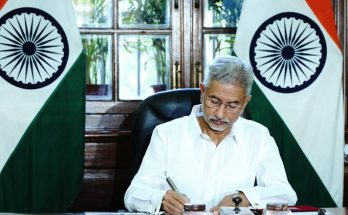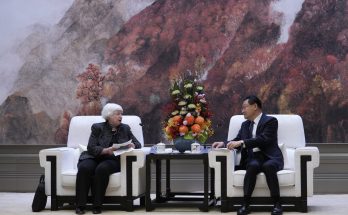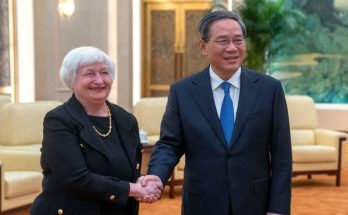 Rebooting a crucial relationship that got mired in mutual recrimination last year, India has pledged $750 million for the post-quake reconstruction of Nepal and pledged to continue partnering the fraternal neighbouring country in its ongoing development journey.
Rebooting a crucial relationship that got mired in mutual recrimination last year, India has pledged $750 million for the post-quake reconstruction of Nepal and pledged to continue partnering the fraternal neighbouring country in its ongoing development journey.
Prime Minister Narendra Modi held wide-ranging talks with his Nepalese counterpart Pushpa Kamal Dahal, better known as Prachanda, in New Delhi on September 16 and underscored New Delhi’s unstinting resolve to bolster development partnership with Kathmandu. By choosing India as the destination of his first foreign trip after assuming office, Mr Dahal has signalled his desire to rejuvenate ties with Nepal’s largest neighbour and development partner.
With Prachanda by his side, Mr Modi waxed lyrical about time-less India-Nepal relations as he celebrated “time-tested and unique partnership” between the two countries. “In the history of our friendship, today is significant day…. Shared rivers, the open border, timeless people to people ties bind our two nations closely,” he said.
Taking their development relationship forward, the two sides signed a pact for Line of Credit of US$ 750 million for post-earthquake reconstruction of Nepal. India also agreed to extend additional Line of Credit for new projects such as Phase-2 of Terai Roads, power transmission lines, substations and a polytechnic in Kaski.
Inclusive Dialogue
 Besides development cooperation, the two leaders discusses security cooperation and exchanged views on the ongoing political reconciliation in Nepal. Lauding Prachanda for being “a catalytic force of peace in Nepal,” Mr Modi voiced confidence that that under “his wise leadership, Nepal will successfully implement the Constitution through inclusive dialogue accommodating the aspirations of all sections of your diverse society.” This was a gentle nudge from Mr Modi to prod the Nepalese leader to focus on addressing aspirations of Madhesis and other minorities whose alleged neglect fuelled months of unrest in the Himalayan state last year.
Besides development cooperation, the two leaders discusses security cooperation and exchanged views on the ongoing political reconciliation in Nepal. Lauding Prachanda for being “a catalytic force of peace in Nepal,” Mr Modi voiced confidence that that under “his wise leadership, Nepal will successfully implement the Constitution through inclusive dialogue accommodating the aspirations of all sections of your diverse society.” This was a gentle nudge from Mr Modi to prod the Nepalese leader to focus on addressing aspirations of Madhesis and other minorities whose alleged neglect fuelled months of unrest in the Himalayan state last year.
Open Borders: The Flip Side
Open borders and open hearts have also their flip side, making the India-Nepal border a conduit for smuggling and other criminal activities. Against this backdrop, the two decides have decided to intensify their security cooperation. “We also agree that our security interests are closely aligned and inter-linked. Open borders between our countries provide great opportunities for cooperation and interaction among our people. But, we must also continue to guard against elements that seek to misuse the border,” said Mr Modi. The Indian leader rightfully underlined the need for continued close cooperation between defence and security agencies of the two countries for promoting and sustaining economic and development partnership between the two countries.
The Way Ahead
India hopes Mr Prachanda’s visit will help begin “a new glorious chapter” in bilateral relations, as Mr Modi said, but this fond hope will have to be tested against hard realities of perennially fractious politics in Nepal. Mr Prachanda, who was earlier seen in India as pro-China, is now seen by the powers-that-be in New Delhi as a more reliable interlocutor than his immediate predecessor K.P. Sharma Oli who unabashedly played the China card to pressure India. Relations soured during Mr Oli’s tenure as he dithered in accommodating demands of Madhesis and courted China ardently as a hedge against India.
In his ongoing visit to India, Mr Prachanda has struck a positive note, saying his country has nothing but “goodwill” for India, and underlined that the destinies of both the countries are “interlinked”.
New Delhi will be watching closely how the Nepali leader goes ahead with implementing the constitution by keeping his focus on inclusion and accommodation of interests of the minorities. “I shared with Modiji that promulgation of the Constitution last year by the popularly elected Constituent assembly was a historic achievement for people of Nepal. You are aware that my government has made serious efforts to bring everyone on board as we enter the phase of implementation of the Constitution,” he said.
 Mr Modi has identified transforming relations with Nepal as a key foreign policy priority. Barely months after assuming office, Mr Modi visited Nepal where he was cheered by the Nepalese people as well as the political class. He visited Kathmandu again for the 18th SAARC summit in Kathmandu and also held talks with Nepal’s then prime minister Sushil Koirala, which resulted in the launch of bus services between the two countries and important initiatives in areas of hydropower, culture and people-to-people linkages.
Mr Modi has identified transforming relations with Nepal as a key foreign policy priority. Barely months after assuming office, Mr Modi visited Nepal where he was cheered by the Nepalese people as well as the political class. He visited Kathmandu again for the 18th SAARC summit in Kathmandu and also held talks with Nepal’s then prime minister Sushil Koirala, which resulted in the launch of bus services between the two countries and important initiatives in areas of hydropower, culture and people-to-people linkages.
The momentum generated by Mr Modi’s two visits to Nepal, however, petered out due to the Madhesi agitation, which was seen by Nepal’s political leadership as a handiwork of India. Mr Prachanda’s visit will hopefully put the period of drift behind and open a new chapter in this mutually nourishing partnership.
Author Profile

- Manish Chand is Founder-CEO and Editor-in-Chief of India Writes Network (www.indiawrites.org) and India and World, a pioneering magazine focused on international affairs. He is CEO/Director of TGII Media Private Limited, an India-based media, publishing, research and consultancy company.
Latest entries
 India and the WorldJuly 9, 2024Defying West, India sets $100 billion trade target with Russia
India and the WorldJuly 9, 2024Defying West, India sets $100 billion trade target with Russia India and the WorldJuly 5, 2024India at SCO: Takes swipe at Pakistan for cross-border terror, pushes alternative to BRI
India and the WorldJuly 5, 2024India at SCO: Takes swipe at Pakistan for cross-border terror, pushes alternative to BRI India and the WorldJune 14, 2024Modi’s Day 1 in Italy: Bonding with Britain, France
India and the WorldJune 14, 2024Modi’s Day 1 in Italy: Bonding with Britain, France India and the WorldJune 13, 2024G7 summit in Italy: Modi to showcase India as leader of Global South
India and the WorldJune 13, 2024G7 summit in Italy: Modi to showcase India as leader of Global South






